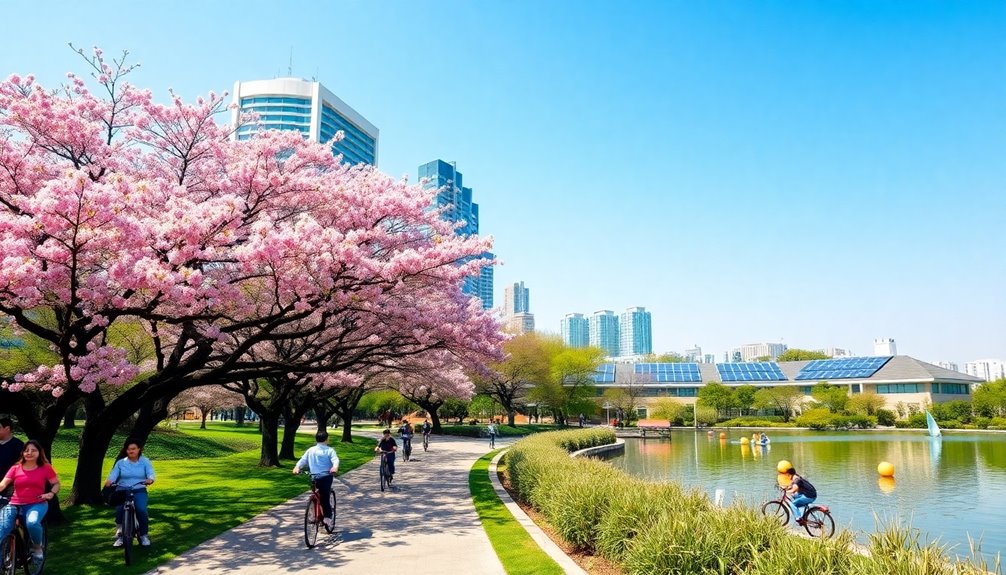Exploring eco-friendly South Korea is a rewarding adventure. You can choose sustainable accommodations and hop on bicycles to explore cities like Seoul, utilizing scenic paths along the Han River. Engage in responsible wildlife tours and visit local markets to support sustainable agriculture. Don't miss the Gyeongju historical sites or the stunning Boseong Green Tea Fields. For a relaxing experience, check out the cherry blossoms in spring! Each choice you make can reduce your carbon footprint and enrich your travel experience. Stick around, and you'll uncover even more tips and spots to enhance your green journey.
Key Takeaways
- Choose eco-friendly accommodations and engage in sustainable practices like recycling and using public transport to minimize your carbon footprint.
- Explore cities like Seoul by renting bicycles for just 1,000 KRW, enjoying fresh air while reducing emissions.
- Participate in eco-tourism programs that support local markets and conservation efforts, enhancing cultural connections and biodiversity awareness.
- Visit Jeju Island, a UNESCO Biosphere Reserve, to experience its unique ecosystems and engage in guided nature walks and organic farm tours.
- Attend local workshops to support artisans and learn traditional crafts, fostering community ties and appreciation for cultural heritage.
Introduction
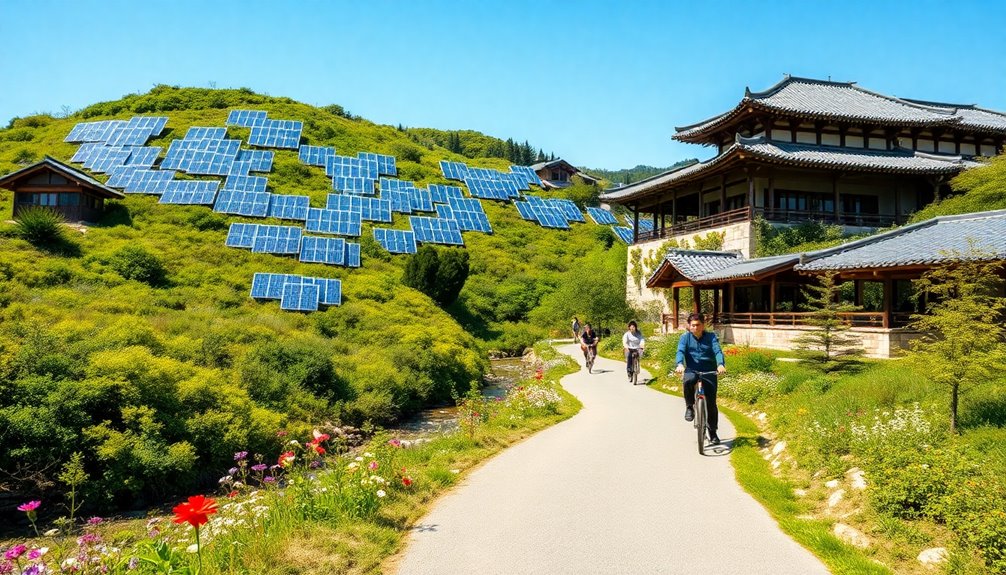
When you explore South Korea, you'll find a stunning blend of cultural richness and natural beauty.
Jeju Island, in particular, showcases a unique ecosystem that's worth preserving.
Cultural Richness and Natural Beauty
As you explore South Korea, you'll discover a captivating blend of cultural richness and breathtaking natural beauty that truly defines this remarkable country. From the ancient city of Gyeongju, known as the "museum without walls," to the stunning landscapes of Jeju Island, South Korea offers diverse experiences that highlight its heritage and environment.
| Cultural Sites | Natural Wonders | Activities |
|---|---|---|
| Gyeongju's ancient ruins | Hallasan National Park | Hiking trails on Hallasan |
| Boseong Green Tea Fields | Jeju's coastline | Tea plantation tours |
| DMZ tours | Seoul Forest's cherry blossoms | Nature walks and picnics |
Immerse yourself in the South Korean spirit as you explore these remarkable places, making unforgettable memories along the way.
Preserving Jeju's Unique Ecosystem
Jeju Island's unique ecosystem demands careful preservation, given its status as a UNESCO Biosphere Reserve that safeguards extraordinary volcanic landscapes and diverse wildlife.
Home to over 400 indigenous plant species and rare animals like the Jeju black cattle, this island plays a crucial role in global biodiversity.
As you explore Jeju Island, remember that its volcanic soil nurtures sustainable agriculture, producing renowned green tea and tangerines.
Local regulations limit tourist numbers in sensitive areas such as Hallasan National Park to minimize environmental impact.
Engage in eco-friendly activities like guided nature walks and organic farm tours to appreciate Jeju's natural wonders.
Travel From USA Direct Flights
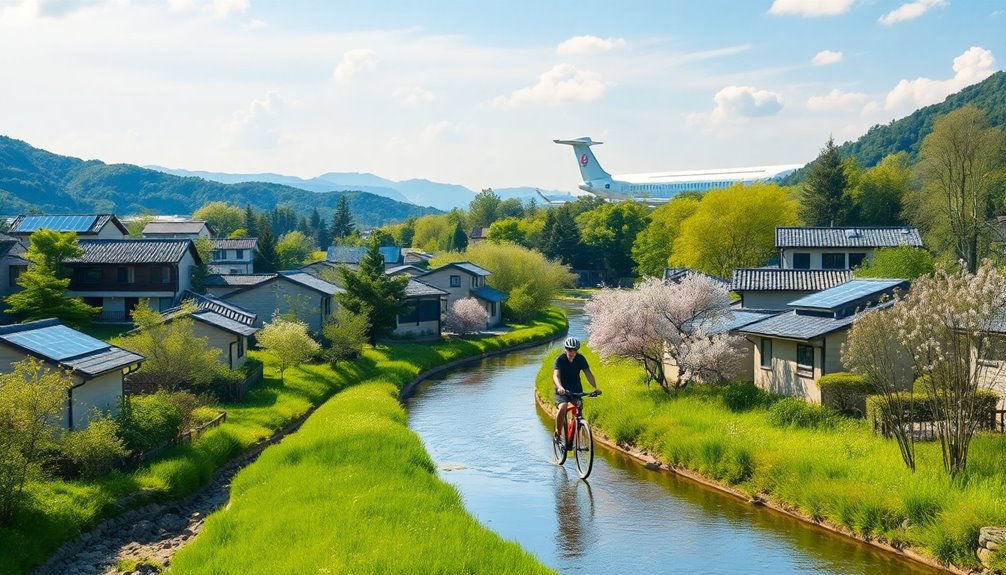
If you're traveling from the USA, you'll find direct flights available from major cities like Los Angeles, San Francisco, and New York.
These non-stop services land you at Incheon International Airport, a hub for eco-conscious travelers.
Once you arrive, you can explore options like bicycle rentals to help keep your trip green.
Direct Flights From Major Cities
Wondering how to reach South Korea without the hassle of layovers? You'll be glad to know there are direct flights from major U.S. cities like Los Angeles, San Francisco, and New York.
Airlines such as Korean Air, Asiana Airlines, and Delta offer convenient service, making your travel smoother and more efficient. The average flight time from the West Coast is about 12-13 hours, while flights from the East Coast take around 14-15 hours.
Plus, with Incheon International Airport ranked among the world's best, you'll enjoy a seamless entry into this eco-friendly destination.
Consider participating in carbon offset programs offered by airlines to further support South Korea eco-tourism while minimizing your environmental impact.
Flights From London to Jeju
Though there are currently no direct flights from London to Jeju Island, you can still reach this beautiful destination with a layover in Seoul. Major airlines like Korean Air and Asiana Airlines frequently operate these routes, typically requiring a transfer at Incheon International Airport (ICN). The average flight duration from London to Jeju, including layover time, ranges from approximately 15 to 20 hours, so plan accordingly.
| Airline | Duration (hours) | Layover Location |
|---|---|---|
| Korean Air | 15-20 | Seoul (ICN) |
| Asiana Airlines | 15-20 | Seoul (ICN) |
| British Airways | 15-20 | Seoul (ICN) |
Booking in advance is advisable, especially during peak seasons, to secure the best rates.
Flights From Sydney to Jeju
How can you reach the stunning Jeju Island from Sydney? Unfortunately, direct flights from Sydney to Jeju aren't typically available.
You'll need to connect through major cities like Seoul or Busan, with a total travel time of around 12-15 hours, including layovers. Major airlines such as Korean Air and Asiana Airlines offer these connecting flights, often stopping at Incheon International Airport (ICN).
To score better deals on flights from Sydney to Jeju, book in advance and stay flexible with your travel dates—round-trip prices usually range from AUD 800 to AUD 1,200.
Don't forget to check visa requirements, as Australian citizens can visit South Korea for tourism without a visa for up to 90 days.
Bicycle Rentals for Eco-Friendly Travel
If you're seeking an eco-friendly way to explore South Korea, renting a bicycle is a fantastic option.
With extensive bicycle rentals available in cities like Seoul, you can easily hop on a bike for just 1,000 KRW ($0.85) for the first hour through the "Seoul Bike" system.
Here are some benefits of cycling in South Korea:
- Discover scenic bike paths, like the Han River Bicycle Path.
- Access numerous tourist attractions and parks effortlessly.
- Contribute to reducing carbon emissions while enjoying fresh air.
Sustainable Wildlife Tours

When you explore South Korea's sustainable wildlife tours, you'll discover eco-friendly encounters that prioritize both nature and animal welfare.
You can participate in nature conservation volunteer programs, allowing you to contribute directly to local ecosystems.
Plus, staying in green-certified lodging options means you can rest easy knowing your choices support sustainability efforts.
Eco-Friendly Wildlife Encounters
While experiencing South Korea's stunning natural beauty, you can engage in eco-friendly wildlife encounters that promote sustainability and conservation.
Here are some ways to explore eco-tourism in South Korea:
- Join hands-on organic farm tours to learn about local farming practices.
- Visit the DMZ for unique tours focusing on the region's natural habitats and wildlife.
- Connect with organizations like the Whale and Dolphin Conservation Society to ethically engage with marine life.
These eco-friendly experiences not only enhance your trip but also support conservation projects that protect habitats and promote wildlife preservation.
Nature Conservation Volunteer Programs
South Korea offers a variety of nature conservation volunteer programs that let you actively participate in wildlife protection efforts. You can engage in activities like monitoring endangered species or restoring habitats in stunning locations such as Jeju Island and Seoraksan National Park.
| Program Location | Activities Available |
|---|---|
| Jeju Island | Reforestation, invasive species management |
| Seoraksan National Park | Habitat restoration, wildlife monitoring |
| National Parks | Eco-tourism tours, educational workshops |
| Local NGOs | Training, resources, long-term conservation goals |
These programs emphasize education about local ecosystems and biodiversity, ensuring you not only contribute but also learn. By joining these nature conservation volunteer programs, you'll help protect South Korea's incredible wildlife while making a meaningful impact.
Green-Certified Lodging Options
Exploring South Korea's stunning landscapes doesn't have to come at the expense of the environment, especially when you choose green-certified lodging options.
These eco-friendly accommodations focus on sustainable practices, helping you enjoy your stay while protecting nature.
Here are some benefits of opting for green-certified lodging options:
- Energy-efficient systems that reduce your carbon footprint
- Locally sourced, organic meals supporting sustainable agriculture
- Opportunities to engage in wildlife tours focused on conservation
In addition, many eco-friendly lodgings are designed to promote sustainable forestry practices, ensuring that your travel contributes positively to the environment.
Whether you're in Jeju Island or Seoraksan National Park, you can find accommodations with eco-certifications from organizations like Green Key or EarthCheck.
Eco-Friendly Accommodation Choices
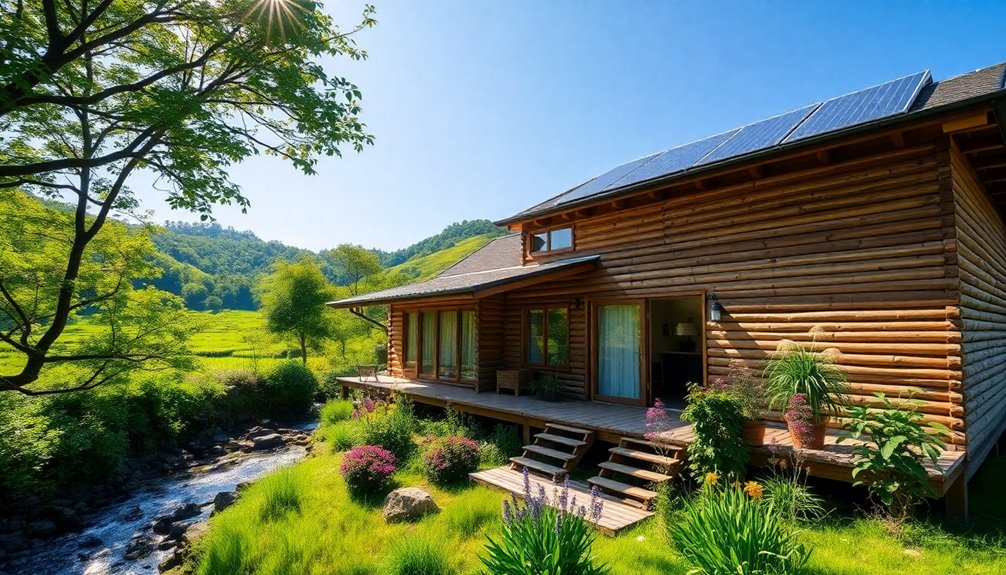
When you're planning a trip to South Korea, consider staying in eco-friendly accommodations that not only enhance your travel experience but also support sustainable practices.
You'll find a variety of options, including guesthouses, eco-lodges, and hotels that focus on energy efficiency and waste reduction. Many of these eco-friendly accommodation choices are conveniently located near popular eco-tourism destinations, making it easier for you to explore the natural beauty of the region while minimizing your carbon footprint.
The government encourages these sustainable options through eco-certification programs, ensuring quality stays. In addition, many accommodations are incorporating renewable energy technologies to further reduce their environmental impact and promote sustainability.
Plus, some lodges use local materials and traditional architecture, giving you a unique cultural experience while contributing to the local economy and community initiatives.
Enjoy your green getaway!
Community Garden Projects
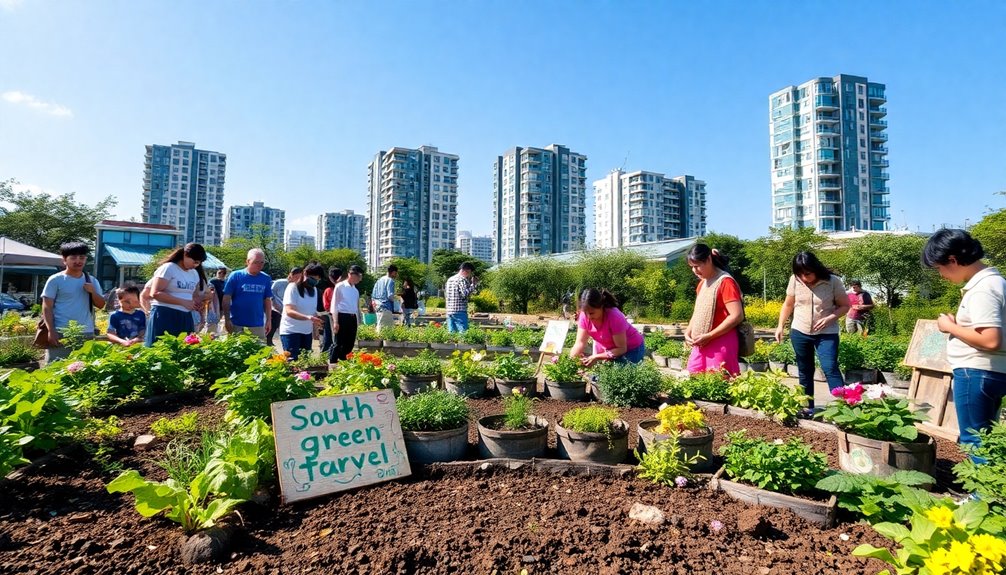
Community garden projects in South Korea thrive thanks to the efforts of the government and NGOs, fostering a sense of collaboration among residents.
You'll find these gardens not only beautify urban spaces but also support cultural sustainability by connecting people through shared gardening experiences.
As you explore these green oases, you can witness firsthand how they enhance community ties while promoting environmental stewardship.
Government and NGO Efforts
As urban areas in South Korea continue to grow, the government has taken significant steps to support community garden projects, integrating them into larger urban greening initiatives. The Seoul Metropolitan Government has established over 200 gardens, encouraging local participation in gardening and sustainable practices.
Through these efforts, residents can enjoy numerous benefits, including:
- Educational opportunities on organic farming and biodiversity
- Community engagement as social hubs fostering connections
- Enhanced mental well-being through interaction with nature
Additionally, these gardens can serve as a platform for hands-on learning about educational toys, promoting skills and knowledge that children can apply in their own gardening experiences.
NGOs also play a crucial role, offering workshops and resources that empower citizens to manage these green spaces effectively.
Together, government and NGO efforts create a thriving environment for both people and nature, promoting sustainability across the urban landscape.
Community and Cultural Sustainability
While urbanization continues to reshape South Korea, community garden projects have emerged as vital spaces for fostering cultural sustainability and local engagement. These projects promote local food production, biodiversity, and community interaction, creating green oases in urban environments.
The Seoul Community Garden Project, with over 130 gardens, allows you to grow your own vegetables and herbs while connecting with neighbors. Many of these gardens emphasize sustainable practices like organic farming and composting, helping reduce waste and improve soil health.
They also serve as educational hubs, offering workshops on gardening and sustainability. Beyond fresh produce, community gardens contribute to mental well-being, as studies show that gardening can alleviate stress and strengthen social ties in the community.
Spring's Cherry Blossom Season
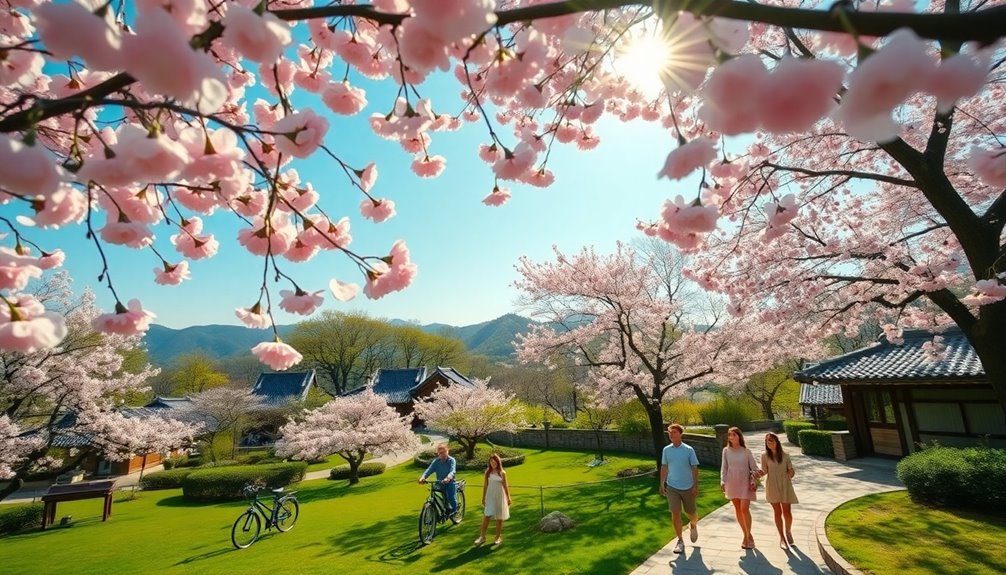
As spring rolls in, you can't help but notice the stunning cherry blossoms blooming across South Korea, painting the landscape in shades of pink.
The mild weather makes it the perfect time for outdoor adventures, but keep an eye on the forecast, as the rainy season can quickly alter your travel plans.
Embrace the beauty of this season while enjoying eco-friendly activities that celebrate nature and culture.
Cherry Blossoms and Mild Weather
Spring in South Korea brings a breathtaking display of cherry blossoms that captivates both locals and visitors alike. Typically peaking in early April, these delicate pink blooms, primarily from the Yoshino variety, attract millions to stunning locations like Seoul and Jeju Island.
The mild weather, with temperatures ranging from 10°C to 20°C (50°F to 68°F), makes it the perfect time for outdoor adventures.
Here are some top cherry blossom viewing spots:
- Yeouido Park, home to the vibrant Yeouido Cherry Blossom Festival
- Jinhae Gunhangje Festival, famous for its picturesque trails
- Various eco-friendly parks that promote sustainable exploration
Additionally, the beauty of cherry blossoms is celebrated in various festivals similar to the Fort Worth Stockyards that honor local heritage.
Embrace this enchanting season while minimizing your environmental impact!
Rainy Season Impacts Travel Plans
Cherry blossom season in South Korea is a magical time that draws countless visitors eager to witness the stunning blooms.
However, the rainy season, which typically runs from late June to late July, can disrupt your travel plans. Even during spring, unpredictable weather may bring sudden downpours, making it crucial to be prepared.
When planning your cherry blossom experience, pack an umbrella and waterproof clothing to stay comfortable.
The rainy season impacts travel plans, particularly for outdoor activities like hiking in national parks such as Seoraksan, where trails can become muddy and slippery.
To make the most of your trip, check weather forecasts and consider visiting indoor attractions like museums and galleries if the rain hits.
How to Make Your Trip More Sustainable
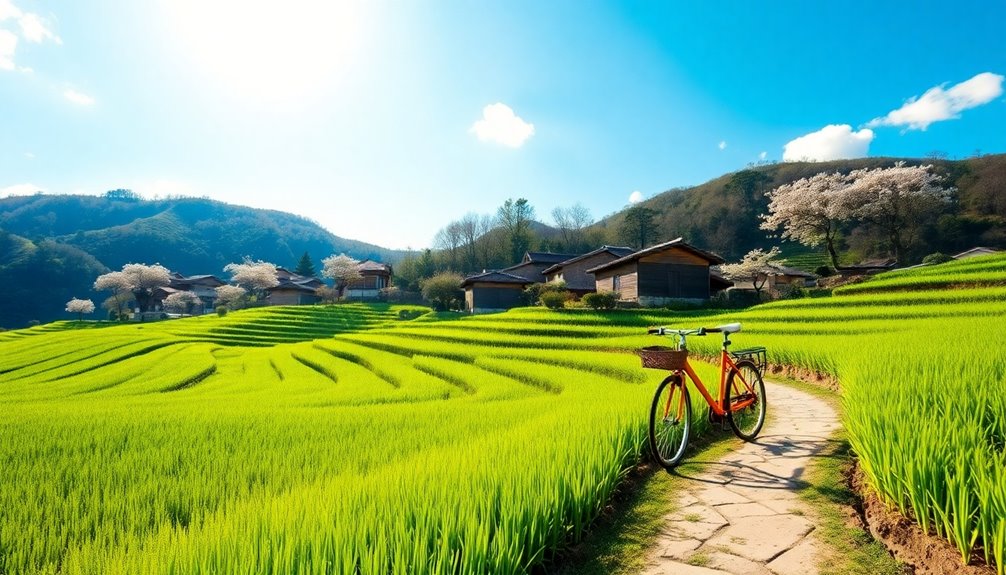
When you're exploring South Korea, consider using reusable containers for your snacks to cut down on waste.
Supporting local artisans not only helps the environment but also gives you a unique glimpse into the culture.
These small changes can make a big difference in creating a sustainable travel experience.
Reusable Containers for Snacks
As you embark on your journey through South Korea, consider packing reusable containers for snacks to make your trip more sustainable. By doing this, you'll help reduce single-use plastic waste and support Korea's recycling efforts.
Plus, you can enjoy delicious food without contributing to container pollution!
Here are some benefits of using reusable containers:
- Fill up at local markets and convenience stores offering bulk snacks.
- Savor street food while minimizing your environmental impact.
- Encourage local vendors to embrace eco-friendly practices by showing demand for sustainable options.
Utilizing reusable containers not only aligns with South Korea's conservation initiatives but also enhances your eco-tourism experience.
Enjoy your travels while being mindful of the planet!
Support Local Artisans
Supporting local artisans in South Korea not only enriches your travel experience but also contributes to sustainable practices that benefit the community. By choosing to support local artisans, you help preserve traditional crafts and boost the local economy.
Many artisans rely on tourism for their livelihoods, so your engagement matters. Participate in workshops like pottery or silk weaving to gain hands-on experiences while ensuring your spending directly benefits the community.
When you purchase handmade products, such as traditional textiles or pottery, you reduce reliance on mass-produced goods and promote sustainability.
Look for eco-tourism programs that include visits to local markets, fostering connections with the culture and encouraging the use of local materials, which ultimately minimizes your carbon footprint.
Frequently Asked Questions
How Eco-Friendly Is South Korea?
You'll find South Korea is quite eco-friendly, with a strong commitment to sustainability.
The country's mandatory recycling programs help reduce waste, while reduced-emission buses improve air quality.
You can enjoy its national parks, like Seoraksan, which focus on biodiversity and conservation.
In urban areas, bike programs promote greener transportation.
Plus, the government encourages eco-tourism initiatives that benefit wildlife and educate visitors.
What Is the Eco-Friendly City in Korea?
If you're looking for the most eco-friendly city in Korea, you can't go wrong with Seoul.
This vibrant metropolis boasts extensive green spaces like Seoul Forest and Cheonggyecheon Stream, which enhance biodiversity.
You'll appreciate the city's mandatory recycling program and reduced-emission buses, making your travels even greener.
Plus, don't miss the incredible Green Wall Vertical Forest—it's the largest vertical garden in the world, showcasing Seoul's commitment to sustainable living.
What Is the Prettiest Place in South Korea?
When you wander through the wondrous woods of Nami Island, you'll find beauty in every breathtaking turn. Those vibrant autumn leaves create a captivating canvas, drawing you into nature's embrace.
But don't overlook Seoraksan National Park, where towering peaks and tranquil trails await your exploration. Each location offers its own unique charm, whether it's the serene tea fields of Boseong or the historical treasures of Gyeongju, ensuring unforgettable experiences in South Korea.
What Are Do's and Don'ts in South Korea?
When visiting South Korea, you should respect local customs, like bowing when greeting and removing your shoes in certain places.
Avoid loud conversations and public displays of affection, as a respectful demeanor is important.
Use public transportation for a more eco-friendly experience, and never litter or dispose of waste improperly—recycling is crucial.
Lastly, learn a few basic Korean phrases; locals appreciate your effort to connect with their culture.
Conclusion
So, pack your bags and forget your carbon footprint—who needs it anyway? While you're sipping on that artisanal coffee from a bamboo cup, just remember that every eco-friendly choice adds a sprinkle of green fairy dust to your adventure. Dive into South Korea's nature, embrace its quirks, and maybe even hug a tree or two (they love that!). After all, the planet's just a big playground, right? Happy eco-trotting, you magnificent green warrior!

